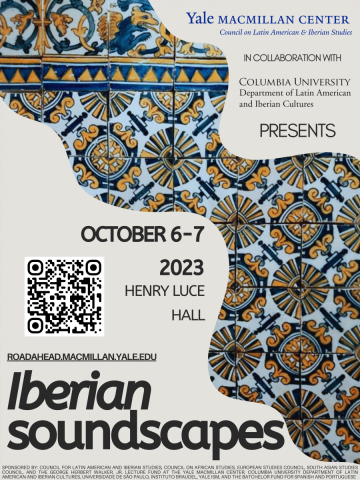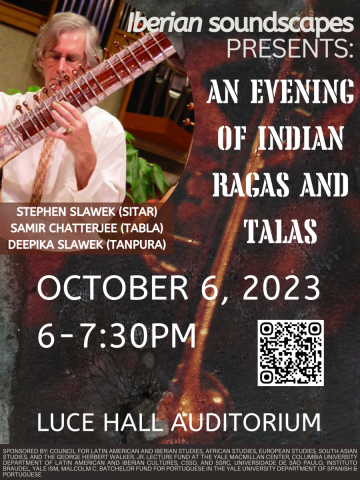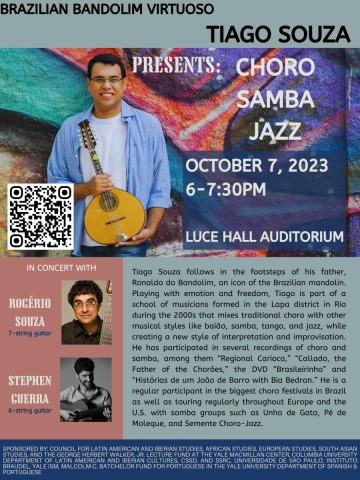The Road Ahead Conference 2023
The Road Ahead / Iberian Soundscapes
You can find each session recorded from this conference.
THE ROAD AHEAD / IBERIAN SOUNDSCAPES is a collaborative conference joining Columbia and Yale Universities to explore the cultural legacy of Iberian expansion in the Americas, Africa, and South Asia. Luso-Hispanic trade relations, religious orders, settlements, and sounds constituted a critical dynamic of colonial expansion. We are especially keen to understand how Portuguese presence in South Asia markedly reshaped social and legal structures of caste, race, gender, and religion, even as new mixed-race communities would emerge there, along coastal Africa, and in Brazil. We aim to bring a unique focus to histories of music and performance by debating the ongoing impact of Iberian seaborne expansion in shaping identities, social distinctions, and cultural expressions. Scholars, musicians, journalists, and other cultural producers will participate in a series of panel discussions and concerts at Yale over two days, October 6 and 7, 2023.
Speaker Bios
Moderators
K. David Jackson
Kenneth David Jackson is professor of Luso-Brazilian literatures and cultures at Yale University. His books range from South Asia -- Sing Without Shame (1990) on Portuguese creole folklore in Sri Lanka and India – to Portugal, with Adverse Genres in Fernando Pessoa (2010), to Brazil, with Machado de Assis: A Literary Life (2015) and Cannibal Angels: Transatlantic Modernism and the Brazilian Avant-Garde (2022). His three CDs in “Journey of Sounds” were featured at EXPO ’98 in Lisbon. In November he will participate in the opening of the International Literary Festival of Paraty dedicated to Pagu with a new anthology of her journalism, “Palavras em Rebeldia.” Other conferences he has organized include “Goa: A post-colonial society between cultures” (2013), “Portuguese World Music” (2007), “Poetry Criticism Translation: Homage to 90 Years of Haroldo de Campos” (2019), and “Brazil 100/200” (2022).
Ana Paulina Lee
Ana Paulina Lee is Associate Professor of Latin American and Iberian Cultures at Columbia University. She is the author of Mandarin Brazil: Race, Representation and Memory (Stanford University Press), winner of the 2019 Antonio Candido Prize for Best Book in the Humanities. Mandarin Brazil examines the way that Brazilian cultural institutes constructed ideas about China and the Chinese to strengthen nationalism and racial whitening ideologies. The book examines the cultural histories of Brazil and China through bringing together a multigenre archive that maps the circulation of trade, labor, and material culture to reveal the connected histories of Chinese and Portuguese expansion and globalization to the hemispheric Americas. She co-directs the working group, Geographies of Injustice, sponsored by the Center for the Study of Social Difference, the Center for Spatial Research, and the Social Sciences Research Council. The social action-centered working group converges at the intersection of research, action, and artistic practice to fortify civil liberties concerning self-housing settlements in Rio de Janeiro and Bombay/Mumbai.
Stuart Schwartz
Professor Schwartz, who received his Ph.D. from Columbia in 1968, specializes in the History of colonial Latin America, especially Brazil and on the history of Early Modern expansion. Among his books are Sovereignty and Society in Colonial Brazil (1973), Early Latin America (1983), Sugar Plantations in the Formation of Brazilian Society (1985), Slaves, Peasants, and Rebels (1992), as editor, A Governor and His Image in Baroque Brazil (1979), Implicit Understandings (1994), Victors And Vanquished: Spanish and Nahua Views of the Conquest of Mexico (2000), Cambridge History Of Native Peoples Of The Americas. South America (1999), and All Can Be Saved: Religious Tolerance and Salvation in the Iberian Atlantic World (2008). He is presently working on several projects: a history of independence of Portugal and the crisis of the Iberian Atlantic, 1620-1670; and a social history of Caribbean hurricanes.
Anupama Rao
Anupama Rao is a professor in the Barnard College History department and the Columbia MESAAS department. Her research and teaching interests include gender and sexuality studies; caste and race; historical anthropology; social theory; comparative urbanism; and colonial genealogies of human rights and humanitarianism. Rao is Principal Investigator for the Global Humanities Institute-CHCI (Mellon) grant, “Global Racisms, Cold War Humanism, and Just Futures,” (2022-2024); co-directs the project, “Geographies of Injustice,” hosted by Columbia’s Center for the Study of Social Difference. (An earlier iteration of this project, “Subaltern Urbanism,” ran with the support of the Heyman Center for the Humanities, and the Center for the Study of Social Difference.) Rao has written widely on the themes of colonialism and humanitarianism, and on non-Western histories of gender and sexuality. Her book, The Caste Question (University of California Press, 2009) theorized caste subalternity, with specific focus on the role of anti-caste thought (and its thinkers) in producing alternative genealogies of political subject-formation. She is completing Ambedkar in America: Reading Castes in India, and working on a set of essays on the political thought of B. R. Ambedkar, as well as a project titled Dalit Bombay, which explores the relationship between caste, political culture, and everyday life in colonial and postcolonial Bombay.
Lisa Voigt
Lisa Voigt is a Professor at the Yale University Department of Spanish and Portuguese. She previously taught at the University of Chicago and Ohio State University. A specialist in colonial Latin American literature and culture, she is the author of Spectacular Wealth: The Festivals of Colonial South American Mining Towns (University of Texas Press, 2016) and Writing Captivity in the Early Modern Atlantic: Circulations of Knowledge and Authority in the Iberian and English Imperial Worlds (Omohundro Institute of Early American History and Culture/University of North Carolina Press, 2009), which won the Modern Language Association’s Katherine Singer Kovacs Prize for an outstanding book published in the field of Latin American and Spanish literature and cultures. Her work has been supported by the National Endowment for the Humanities, Mellon Foundation, Fulbright, and most recently an ACLS Collaborative Fellowship for a coauthored book on recycled and copied illustrations of the non-European world in early modern European travel accounts. She is also working on several publications emerging from her involvement in Public Rituals in the Portuguese Empire (2018-2022), including a monograph on the representation and participation of Africans and Amerindians in early modern Portuguese festivals. She is the Special Issues Editor of Colonial Latin American Review.
Sunil Amrith
Sunil Amrith is the Renu and Anand Dhawan Professor of History, and current chair of the South Asian Studies Council. His research focuses on the movements of people and the ecological processes that have connected South and Southeast Asia. Amrith’s areas of particular interest include environmental history, the history of migration, and the history of public health. Amrith is the recipient of the 2022 Dr. A.H. Heineken Prize for History, a 2017 MacArthur Fellowship, and the 2016 Infosys Prize in Humanities. His work on environmental justice received a “scientific breakthrough of the year” award from the Falling Walls Foundation in 2022.
Keynote Speaker
Naresh Fernandes
Naresh Fernandes is a journalist who lives in Bombay. He is the editor of Scroll.in, a digital daily, and a consulting editor at National Geographic Traveller India. Naresh was previously editor-in-chief of Time Out India, which has editions in Mumbai, Delhi and Bangalore. He has also worked at The Times of India and the Associated Press in Mumbai, and The Wall Street Journal in New York. He is the author of the widely acclaimed and prize-winning book, Taj Mahal Foxtrot: the definitive history of Bombay’s jazz age from the 1930s-1960s (Roli Books, 2012); the product of many years of research, it was written up during his tenure as a Poeisis Fellow at the Institute of Public Knowledge at New York University. He maintains an active blog on the archival material excavating through the work on Taj Mahal Foxtrot and has most recently authored a new book, City Adrift: A Short Biography of Bombay (Aleph Books, 2013).
Introduction to Soundscapes
Kevin A. Fellezs
Kevin Fellezs is an Associate Professor at Columbia University, where he holds a joint appointment in the Music and the African American and African Diaspora Studies departments. His work focuses on the relationship between the social and the aesthetic in popular music. He has written on a wide range of music from jazz to Hawaiian slack key guitar to heavy metal to enka (a Japanese popular music genre). His first book, titled Birds of Fire: Jazz, Rock, Funk and the Creation of Fusion (Duke University Press, 2011), is a study of fusion (jazz-rock-funk) music of the 1970s framed by insights drawn from cultural studies, popular music studies, jazz studies, and ethnic studies. His second book, Listen But Don’t Ask Question: Hawaiian Slack Key Guitar Across the TransPacific (Duke University Press, 2019), is a transPacific ethnographic study conducted in Hawai‘i, Japan, and California, into the ways in which Kanaka Maoli and non-Hawaiian guitarists articulate Hawaiian values and notions of belonging through their performances of kī hō’alu, or Hawaiian slack key guitar, in those three distinct locations.Fellezs has published articles in Jazz Perspectives, the Journal of Popular Music Studies, the Journal of the Society for American Music, Metal Music Studies, and the Institute for Studies in American Music Newsletter. He has also published essays in a number of edited anthologies including Alien Encounters: Asian Americans and Popular Culture (Duke University, 2007), Yellow Power-Yellow Soul: The Radical Art of Fred Ho (University of Illinois, 2013), The Cambridge Companion to the Singer-Songwriter (Cambridge University, 2016), Racism Postracism (Duke University Press, 2019), and Playing For Keeps: Improvisation in the Aftermath (Duke University Press, 2020).
Soundscapes in Brazil and India
Susana Sardo
Susana Sardo is Associate Professor of Ethnomusicology at the University of Aveiro (Portugal) and Visiting Professor at Goa University (India), for the Cunha Rivara Chair. Her research interests include music and post-colonialism, sound archives, music in the Lusophone world, and the intersection of music and post-dictatorship regimes. Since 2013 she has been actively engaged in promoting shared research practices in ethnomusicology using research as a means for social transformation in the field. Since 2017 Susana Sardo belongs to the steering committee of the study group on Sources and Archives for Music and Sound Studies of the International Council for Traditional Music (ICTM) and since 2023 to the Executive Board of ICTM. In 2007, she founded the University of Aveiro branch of the Institute of Ethnomusicology - Research Center for Music and Dance (INET-md), which she coordinated until January 2023.
Micah Oelze
Micah Oelze is Assistant Professor of Latin American History at New York's Adelphi University. He writes on music, psychology, and pedagogy. His current book project examines Brazil's interwar forays into social engineering and nation-building. He looks closely at a cohort of scholars in the 1930s who researched the possibilities of fusing psychoanalysis with the symphony orchestra to tap into each listener's subconscious and modify their behavior. Outside of the library and classroom, Oelze is also a professional guitarist who performs Brazilian and Caribbean music around New York.
Gérald Estadieu
Gérald Estadieu is an Assistant Professor in the Faculty of Arts and Humanities at the University of Saint Joseph (USJ) - Macao, teaching in the Department of Architecture & Design. With a Master's Degree in Signal and Image Processing from the Université d’Orléans (France) and a PhD in Science and Technology of the Arts from the Catholic University of Portugal (School of Arts, Porto), his research and artistic activities focus on the fields of Interactivity, Soundscape, Hacking and Digital Fabrication. His current funded research project is related to Artificial Intelligence and Soundscape, in which the team is developing a deep learning model to analyse Macau Soundscapes. The ultimate goal is to develop an analytical solution for sound and noise pollution in the context of the UN's SDG: Sustainable Cities and Communities as well as Good Health and Well-Being. He created the fablab at the University of Saint Joseph and co-founded the first fablab in Macau. He is also a member of several international collaborative experiments, such as Museomix and Hackmychurch and developed artistic projects in local and international exhibitions integrating interactive technology and digital fabrication. His work has been exhibited in Macau, Portugal and South Korea.
Pedro Aragão
Pedro Aragão is an assistant professor at the Universidade do Rio de Janeiro (UNIRIO). His research interests encompass Brazilian popular music, the music industry, popular music, sound archives, and the Lusophone world. He is the author of Alexandre Gonçalves Pinto e 'O Choro,' which garnered the 2012 "Silvio Romero" Award from the Instituto do Patrimônico Histórico Brasileiro and the 2013 "Produção Crítica em Música" Award from the Fundação Nacional de Artes (FUNARTE). He co-organized three books with Bia Paes Leme, Paulo Aragão, and Marcilio Lopes featuring Pixinguinha's arrangements for Brazilian radio orchestras during the 1940s and 1950s: Pixinguinha, Inéditas e Redescobertas, Pixinguinha: Outras Pautas, and Carnaval de Pixinguinha, edited by the Instituto Moreira Salles in 2012 and 2014. From 2018 to 2023, he was a research scholar at the Universidade de Aveiro, where he directed the LiberSound Project, dedicated to the study of sonic archives covering Brazil, Mozambique, Portugal, and India (Goa).
The Social Space of Music and Sound in Mumbai
Aneesh Pradhan
One of India’s leading tabla players, Aneesh Pradhan is a disciple of the illustrious tabla maestro Nikhil Ghosh from whom he inherited a rich and varied repertoire of traditional tabla solo compositions from the Delhi, Ajrada, Lucknow, Farrukhabad and Punjab gharanas. Aneesh broadcasts regularly on Indian radio and television. He has also been featured on radio and television networks overseas and was one of the presenters for a radio series entitled “Perspectives – North Indian Classical Music” featured on the Australian Broadcasting Corporation. His inputs on the rhythmic aspects of this system of music were of particular significance to this series. Apart from his work with art music, Aneesh Pradhan is also a frequent participant in cross-cultural musical collaborations both in the capacity of performer and composer. Drawn equally towards melody and rhythm, Aneesh’s compositions range from pieces composed for tabla solo repertoire, to melodic and text-based compositions that are based on traditional vocal and instrumental forms of Hindustani music. He is the author of a children’s book on tabla, which is part of a forthcoming twelve book series entitled Baajaa Gaajaa: Musical Instruments of India. He has also written Tabla: A Performer’s Perspective, which gives an overview of the stylistic features and performance contexts of the instrument. He has been awarded a medal by the Asiatic Society of Mumbai for his book entitled Hindustani Music in Colonial Bombay. His latest ebook is called Hindustani Music: Ways of Listening, a collection of articles that he had written over two years for Scroll.in, a digital publication. His latest book is entitled Chasing the Raag Dream: A Look into the World of Hindustani Music.
Rasika Ajotikar
Rasika Ajotikar is Junior Professor of Ethnomusicology at the Institute for Music and Musicology and the Center for World Music at University of Hildesheim, Germany. She was a British Academy Postdoctoral Fellow at SOAS, also her alma mater, from where she completed her PhD in 2019. Rasika also held postdoctoral positions at the department of Musicology and the Center for Modern Indian Studies at University of Goettingen, Germany. Rasika's research is on the musical landscape of anti-caste thought in modern western India. She is currently working on a monograph that draws on an ethnography of activists and musicians in anti-caste and Ambedkarite spheres to examine hereditary artisanship and its links with labour, art and emancipatory politics. Whilst deliberating on the political and aesthetic dimensions of resistance, this book also highlights issues surrounding censorship, state repression and incarceration of Dalit activists and musicians. Rasika is also a singer trained in the North Indian classical music tradition. She has been performing and experimenting with various genres of music and also collaborating on projects with musicians in an anti-caste collective in western India.
Urmila Bhirdikar
Urmila Bhirdikar teaches Sociology in Shiv Nadar Institute of Eminence, Delhi-NCR. She trained in Khayal in the Hindustani Music tradition. Her teaching and research interests are in the fields of gender and sexuality, caste and community, translation and sound studies.
Acoustic Justice in Brazil and India
Sérgio Infante
Sergio Infante is a Ph.D. student in Global History. His research focuses on the relationship between the social sciences and antipoverty programs in twentieth-century South America. He is writing a history of the “informal sector” and “informal economy” as concepts. His work touches on several themes that concern historians of the recent past, such as economic development, poverty, unemployment, population growth, labor migration, and the Cold War.
Sergio received a B.A. in History from Yale College in 2018 and an M.Phil in Modern South Asian Studies from the University of Cambridge in 2019. Before enrolling at Yale, Sergio was an editor at Foreign Affairs Magazine.
Ana Luiza de Abreu Claudio
Ana Luiza is currently a Ph.D. student at Columbia University's Latin American and Iberian Cultures Department. With a background in journalism and social sciences, she focuses her research on under-represented territories, especially favelas and indigenous communities. Her research explores the intersection of visual arts such as photography, performance, cinema, activism, and Amazonian poetics. She has gained extensive experience by working on various projects across Brazil and internationally, spanning from art museums, consultancy, to NGOs. Ana Luiza has also held the position of Coordinator of the Social Action at Brazil's Moreira Salles Institute.
Marcos Balter
Marcos Balter (b.1974, Rio de Janeiro, Brazil) is the Fritz Reiner Professor of Musical Composition at Columbia University. He is the recipient of the American Academy of Arts and Letters Music Award, John Simon Guggenheim Foundation Fellowship, Civitella Ranieri Fellowship, Tanglewood/Leonard Bernstein Fellowship, two Chamber Music America Awards, a Harvard University Fromm Award, and a Library of Congress Serge Koussevitzky Award. Community building, access, and social impact are constants in his professional projects and creative thinking. His community-based work Pan “tells a version of the mythical story of the demigod Pan while exploring how storytelling and music can bring people together" (Joshua Barone, The New York Times) where “the cult of the godlike artist gives way to a collective ceremony—art as grassroots action” (Alex Ross, The New Yorker). For the opening of the New York Philharmonic new Geffen Hall in October of 2022, he created Oyá, a multimedia work for orchestra, lights, and electronics, which is part of a series of works spanning two decades inspired by Yorubá traditions. Other recent collaborators include the Los Angeles Philharmonic, singers/songwriters Paul Simon and José Gonzales, the punk-rock band Deerhoof, DJ King Brit, and contemporary music ensembles worldwide.
Soundscapes in Cabo Verde and India
Ângela Barreto Xavier
Ângela Barreto Xavier is Senior Researcher at the Instituto de Ciências Sociais da Universidade de Lisboa. Her primary research is about questions of power and domination and the agency and subjectivities of subaltern people in the context of the Portuguese early-modern empire. She is also interested in the connections between power, religion and science. Some of her publications are Religion and Empire in Portuguese India. Conversion, Resistance, and the making of Goa (2022); Catholic Orientalism. Portuguese Empire, Indian Knowledge (16th-18th centuries) (with Inês G. Zupanov, 2015); O Governo dos Outros. Poder e Diferença no Império Português (ed. with Cristina Nogueira da Silva, 2016); Monarquias Ibéricas em Perspectiva Comparada. Dinâmicas Imperiais e Circulação de Modelos Administrativos (ed. with Federico Palomo and Roberta Stumpf, 2018).
Ana Flávia Miguel
Ana Flávia Miguel is an Ethnomusicologist and Assistant Researcher at the University of Aveiro / Institute of Ethnomusicology - Center for Studies in Music and Dance. She has conducted fieldwork in Brazil, Cape Verde, France, Italy, Mozambique, Portugal and South Africa. Her main areas of study include Cape Verdean music, music and migration, music and postcolonialism, intangible cultural heritage, digital archives, and shared research practices. She has participated in various research projects, such as Skopeofonia, SOMA, Atlas, and Libersound. More recently, she is leading the project "Cesária Évora: documenting paths and discourses" (2023). Currently, she is a member of the executive board, with responsibility for internationalization, at the Department of Communication and Art of the University of Aveiro.
Filipa Vicente
Filipa Lowndes Vicente is a historian and researcher at the Institute of Social Sciences of the University of Lisbon (ICS-ULisboa). In 2000, she completed her PhD at the University of London (Goldsmiths College). In 2015, she was a visiting professor at King’s College London and in 2016 at Brown University, in the USA. Vicente’s work on Goa and India has resulted in a few articles and two books: Other Orientalisms: India between Florence and Bombay (1860-1900), in 2012, and Entre dois impérios. Viajantes Britânicos em Goa (1800-1940), in 2015.
Musician Bios
Stephen Slawek
Professor Emeritus Stephen Slawek, a senior disciple of the late Pandit Ravi Shankar, enjoys an international reputation as a foremost exponent and teacher of the Indian sitar. During his four-decade career at the University of Texas at Austin he added an Asianist perspective to the curricular offerings of the ethnomusicology program in the Butler School of Music, specializing in the musical traditions of South Asia, but with secondary interests in Southeast Asian music and American popular music. His publications draw upon extensive field experience and personal studies of performance practice in India. He has supervised numerous doctoral students, many of whom are now enjoying careers in academia. He is a past editor of Asian Music, the Journal of the Society for Asian Music, and has served as Second Vice President of the Board of the Society for Ethnomusicology, and as Chair of the Ethnomusicology Committee of the American Institute of Indian Studies.
Samir Chatterjee
Samir Chatterjee is a virtuoso Tabla player from India. He travels widely across the world throughout the year performing in numerous festivals as a soloist or with other outstanding musicians from both Indian and non-Indian musical traditions. Samir performed at the Nobel Peace Prize ceremony in Oslo, Norway in 2007. He also performed a few times at the United Nations General Assembly. His compositions are widely acclaimed as well as his writings. Samir is a firm believer in the transforming effect of music on the society and all aspects of his work reflects this conviction.
Chatterjee began his studies early with Pandit Bankim Ghosh, Pt. Balaram Mukherjee, Pt. Rathin Dhar and Mohammad Salim. His later formation as a musician occurred under the guidance of Pt. Amalesh Chatterjee (since 1966) and Pt. Shyamal Bose (since 1984). All of Samir's teachers have been from the Farrukhabad Gharana (school) of Tabla-playing, which he now represents.
Deepika Slawek
Deepika Slawek, MD, MS is Assistant Professor of Medicine at Albert Einstein College of Medicine and Montefiore Medical Center. She is a physician and clinical researcher in the Bronx, NY and her work focuses on HIV care and addiction medicine. Outside of work, Deepika has learned Hindustani music since childhood from her parents, and engaged in formal sitar training throughout college and medical school. She is privileged to have learned from Dr. Stephen Slawek, Anita Slawek, and Pandit Ravi Shankar.
Tiago Souza
Tiago Souza follows in the footsteps of his father, Ronaldo do Bandolim, an icon of the Brazilian mandolin. Playing with emotion and freedom, Tiago is part of a school of musicians formed in the Lapa district in Rio during the 2000s that mixes traditional choro with other musical styles like baião, samba, tango, and jazz, while creating a new style of interpretation and improvisation. He has participated in several recordings of choro and samba, among them “Regional Carioca,” “Callado, the Father of the Chorões,” the DVD “Brasileirinho” and “Histórias de um João de Barro with Bia Bedran.” He is a regular participant in the biggest choro festivals in Brazil as well as touring regularly throughout Europe and the U.S. with samba groups such as Unha de Gato, Pé de Moleque, and Semente Choro-Jazz.
Rogério Souza
Guitarist, composer, and arranger Rogério Souza is one of the great representatives of the carioca language as well as the Brazilian guitar. He has been involved in the largest events related to MPB (Música popular brasileira, Brazilian popular music), mainly in choro and samba.
Stephen Guerra
Stephen Guerra is a band leader, accompanist, composer, arranger, and educator based in New York City. He performs at music clubs, cultural centers, universities, and guitar societies and has shared the stage with Rogério Souza, Duo Violão, Ami Molinelli, Tiago do Bandolim, Q Morrow, and Regional de NY.
Conference Agenda
Friday, October 6
1:00 p.m. – 2:00 p.m. - Welcome & Keynote Address
K. David Jackson, Yale University, Professor of Luso-Brazilian Literatures and Cultures
Sunil Amrith, Yale University, Professor of History
Anupama Rao, Professor, History and MESAAS; Director, institute for Comparative Literature and Society
Keynote Address - Naresh Fernandes, editor, Scroll; author of Taj Mahal Foxtrot
2:00 p.m. – 3:00 p.m. - Introduction to Soundscapes
Kevin A. Fellezs
Learning to Listen with Empathy
Columbia University, Professor of African American Studies, Music, and Director of Center for Jazz Studies
3:00 p.m. – 5:00 p.m. - Soundscapes Brazil, India, and Macau
Susana Sardo
Listening to the Post-Empire: Fado and Mando in Goa as Performative Devices for Cultural Sovereignty
University of Aveiro, Associate Professor of Ethnomusicology
Micah Oelze
Racial Counterpoint, Colonial Rescoring: The Politics of Psychomusical Realism in Brazil’s Interwar Concert Scores
Adelphi University, Assistant Professor of Latin American History
Gérald Estadieu
Soundscape.Ai - Sonic Perspectives on Macau
University of St. Joseph, Assistant Professor in the Faculty of Arts and Humanities
Pedro Aragão
Connecting Sound Archives in Lusophone Countries:
Challenges and questions of the Libersound project
University of Rio de Janeiro, Assistant Professor of Musicology
Moderator: K. David Jackson
5:00 p.m. – 6:00 p.m. Reception
Luce Hall Common Room
6:00 p.m. – 7:30 p.m. - Concert - An Evening of Indian Ragas and Talas
Stephen Slawek, Sitar
Samir Chatterjee, Tabla
Deepika Slawek, Tanpura
Saturday, October 7
9:00 a.m. – 9:30 a.m. - Breakfast
Luce Hall Common Room
9:30 a.m. – 11:00 a.m. - The Social Space of Music and Sound in Mumbai
Aneesh Pradhan (online)
Patronage, Migration and Performance: Goan Practitioners of Hindustani Music in Colonial Bombay
Musician, Performer, Composer
Rasika Ajotikar (online)
Music and Anti-caste Thought in Modern Western India
University of Hildesheim, Junior Professor of Ethnomusicology
Urmila Bhirdikar (online)
Riots and Ragas in Bhendi Bazaar: An Exploratory Report on a Place Behind a Market in Colonial Bombay
Shiv Nadar Institute of Eminence, Delhi-NCR, Associate Professor of Sociology
Moderator: Anupama Rao
11:00 a.m. - 1:00 p.m. - Acoustic Justice in Brazil and India
Sérgio Infante
Hearing Wrong? Hearing Right? Diplomacy, Development, and Brazil–India Relations
Yale University, PhD Candidate in Global History
Ana-Luiza de A. Claudio
The Sounds and Echoes of the Alleys and Streets: A Perspective on the Oral Histories of the Rocinha Memory Project
Columbia University, PhD student in Latin American and Iberian Cultures
Marcos Balter
Candomblé as a Point of Creative Departure
Columbia University, Professor of Music
Moderator: Ana Paulina Lee
1:00 p.m. – 2:00 p.m. - Lunch
Luce Hall Common Room
2:00 p.m. – 4:45 p.m. - Soundscapes in Cabo Verde and India
Ângela Barreto Xavier
The “New English America” in a Brahmin Conspiracy Against the Portuguese Imperial Domination
Institute of Social Sciences of the University of Lisbon, Historian and Senior Researcher
Ana Flávia Miguel
An Irreplaceable Queen: Thoughts on Cape Verdean Music
University of Aveiro, Researcher of Ethnomusicology
Filipa Vicente
Words Without Images (1860s-1900s): Photography in Goa and by Goans, Before and Beyond Souza
Institute of Social Sciences of the University of Lisbon, Historian and Researcher
Moderators: Stuart Schwartz and Lisa Voigt
4:45 p.m. - 6:00 p.m - Reception
Luce Hall Auditorium
6:00 p.m. – 7:30 p.m. - Concert
Brazilian Bandolim Virtuoso Tiago Souza Presents “Choro-Samba-Jazz”
Tiago Souza, Brazilian Bandolim
Rogério Souza, 7-String Guitar
Stephen Guerra, 6-String Guitar
In collaboration with Columbia University














